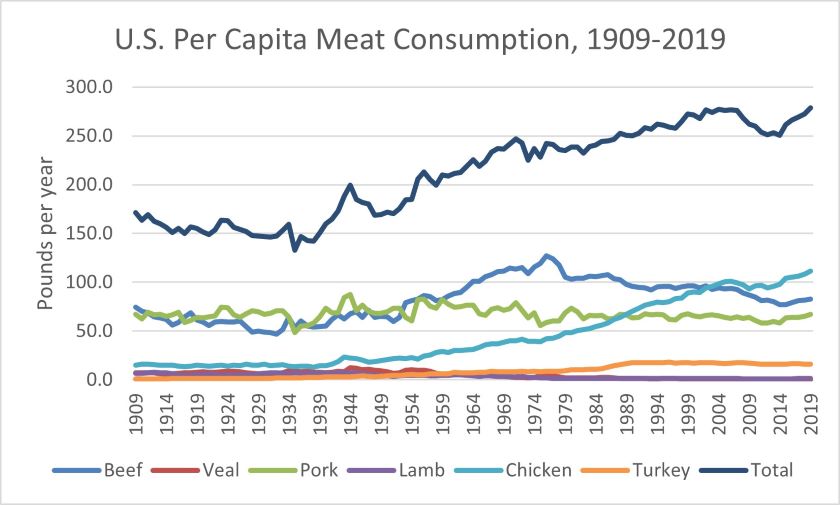I’m not working in the meat industry, but in the german food industry. German meat consumption has gone significantly down, but the most “feelable” effect would be that vegan and/or vegetarian options are now a must for every restaurant owner who knows what he is doing. A few years ago it was normal for restaurants to have no vegan option on the menu or for them to be kind of crappy. Now there are so many vegetarians that you will run into problems with your restaurant if your vegetarian option is crappy - because those vegetarians will complain to their family and friends and lead them into other restaurants.
(and yeah, there are still restaurants left without good options for vegetarians. Your region also might play a role - but chances are that you can find a pizza without meat on the menu that is not a Margherita)
the most “feelable” effect would be that vegan and/or vegetarian options are now a must for every restaurant owner who knows what he is doing.
As a life-long lacto-ovo vegetarian, this is one of my favourite things. There are so many options now. When I was a kid, the options were few, and you never went out to restaurants (unless they were super specific weirdo niche vegetarian/vegan restaurants) because there weren’t any options for you.
MacDonalds had a vegetarian burger here for a while, but they discontinued that after a while because it wasn’t popular. Max, another fast food chain here, now has like three different vegan patties, and one vegetarian one, and there are dozens of burger/whatever variations. It’s amazing and makes me feel like a normal person.
I was never a huge fan of the gluten free/vegan/whatever trends, but I’m so glad for the positive effects they had on food culture as a whole.
It helps a lot for the burgers that there are now actually good fake meat options. Before the Impossible burger you basically had to lie to yourself to think fake meat was equivalent.
I’ve never had a “real” burger is the thing, so personally I really don’t care. I think I even prefer the veggie patties with whole peas and stuff in them, they’re texturally more interesting. The impossible burger isn’t that nice in my opinion.
Max has four types. There’s an impossible-burger-esque one. There’s one that’s like a battered chicken thing. There’s one that’s somewhat reminiscent of falafel, and finally a halloumi one. They’re all okay.
I actually stopped going to Burger King when they started doing Impossible patties because they nuked their veggie patty.
I can see that. It’s overpriced and boring. I’m really fond of the falafel-esque patty that Max has.
Even in the US, which consumes a pretty unhealthy amount of meat per capita, you can see that impact somewhat. Vegan options are still iffy compared to vegetarian ones, but there are definitely more places I can eat now than ever. The suburbs aren’t nearly as good as cities, but that’s to be expected, I think. Even compared to a few years ago, it’s better - it’s not just a sad plate of lettuce with no dressing or dry pasta.
I won’t say that people’s meat consumption is down here because data doesn’t back that up, but at least those of us who don’t eat it are finally getting a few choices.
Bonefish grill. There are no good vegetarian options at bonefish grill. So every company outing we have, we don’t go there anymore, even though it’s the closest place.
It seems like any place with a decent chunk of money will also be a place with more veg-friendly restaurants.
When even Culver’s has a veggie burger, the times are changing.
Volume is pretty rigorously tracked by regulatory bodies that are responsible for food safety.
The US’s data is here: https://www.ers.usda.gov/data-products/livestock-and-meat-domestic-data/
I’d copy and paste some stuff into this thread, but it looks like some parts of this site are under maintenance right now. That said, others have charted the data. https://www.agweb.com/opinion/drivers-us-capita-meat-consumption-over-last-century

Woah, looks like chickens were our friends until the 1940s when people started eating the friends
The 1940-1950 era is the rough timeframe when the factory farming of poultry took off, especially once antibiotics started being widely used to group even more chickens together in those factory conditions. e.g. https://en.wikipedia.org/wiki/Antibiotic_use_in_the_United_States_poultry_farming_industry#History_of_federal_policy_on_antibiotic_use_in_livestock
There’s a number of factors, including a concerted effort by the USDA to drive chicken consumption.
The Search Engine podcast did a two part episode about chicken bones that discusses the rise of chicken as a food product: https://pjvogt.substack.com/p/why-are-there-so-many-chicken-bones
Lamb is at 0 lbs/y? I find that and turkey to be suspiciously low
I believe it. I’m not American but Canadian (our diets tend to be similar) and before I became vegetarian I literally had never once eaten lamb, and turkey was only a Easter / Thanksgiving / Christmas meal. Keep in mind the number probably isn’t 0 but close to it, it’s just hard to see on the graph.
I had to reread your comment like 5 times because I kept reading “chickpeas” instead of “chickens”
That’s actually quite an insane chart. So the average american eats around 125kg of meat a year? France is at 83kg, Italy at 81kg and Canada at 82kg.
https://en.wikipedia.org/wiki/List_of_countries_by_meat_consumption
Current german recommendations for healthy eating are saying that around 300 grams of meat a week are the max and Americans really seem to eat that every day.
Apparently so, but there is a wide variance in American diets. I wouldn’t be surprised if the biggest meat eaters are skewing that data quite a bit.
It’s not exact, but I just did a tally of the meat I’ve bought in the last year and it’s about 20 lbs. I could’ve forgotten something, and had a handful of meals out, so I’ll round up to 25lbs to be safe. Totally anecdotal, but 9% of the average listed here. I know I’m on the low end, but for most of my family I’d be pretty shocked if they ate over 3lb a week, or ~150lbs a year.
I live in the south and it seems like about half the people I meet eat more along the lines of what seems normal to me for someone eating meat, anywhere from 4-10x a week. A lot of those outside of dinners can be very small amounts of meat.
The other half unfortunately seem to be the type that consider it a tough challenge when they stop eating meat at every single meal, and it’s often at least 30% of their meal. It’s wild.
Any idea what caused the dip from 04 to 09?
There might be a number of factors, but most notably, beef prices started to rise and people switched to other meats, also 2003, 05 and 06 marked the first 3 documented outbreaks of mad cow disease in the US.
Turns out the easiest way to get people to not eat meat is to just raise the prices
The deadly brain eating disease was also a good turn off when it became new to North America.
I see the 2008 decline in beef.
Thanks to Oprah
I’d think the financial crash. What did Oprah say?
Oprah did a very controversial, very public show about mad cow disease, implying it was in America, and led to a big lawsuit.
There are multiple sources of info, but for some easy listening, checkout the podcast ‘Maintenance Phase’ which did a 2 part feature on it.
Is that actually what we’re seeing reflected in the graph? Mmm, I’m not convinced. But it’s definitely true that she did hurt the beef industry in America.
Wow, thanks, that was interesting! It seems like people kind of gave up around 2017. Or some other indirect factor.
TIL Americans fucking loooove chicken
I would eat fried chicken every day if it wouldn’t kill me.
I’d honestly take chicken over beef just about any day. I’m committing chicken genocide.
Chicken wings are so hot right now
I can get chicken leg quarters for $0.99 per lb., what’s not to love? 😂
The
consolationconsolidation of meat packing has had a significant effect on producers. Possibly greater than fewer people eating meat. For those that can try to buy your meat from a local farmer or rancher. It will taste better and is more ethical.Fuck JBS, Cargill, National Beef and Tyson.
https://prospect.org/power/big-four-meatpackers-crushing-small-ranchers/
Edit
Consolidation perhaps?
Yeah, my thumbs don’t know how to spell
deleted by creator
redacted
Reddit would have hundreds of resposes, true or not.
Honestly, it’s the same with Lemmy. Lemmy has no shortage of overly confident people who have everything figured out, despite having little to no data or first hand experience with the topic at hand.
That’s everywhere on the internet.
Give everyone a platform to be heard and anonymity to hide who they are and you will suddenly have a bunch of experts.
I’m sorry but my dad works for the internet and he told me that wasn’t true
Damn, you sound like an expert.
Much, possibly most, of the lemmy userbase is just people that used to use reddit until recently or still do, so this is unsurprising
I’m sure. I don’t think I should trust any other platform any more (people being partially informed, delusional, idiots, or just trying to paint reality in their preferred colour are everywhere, from town hall meetings to 4chan), but I was just genuinely curious. The question arose in me today when I looked at the egg carton that said it was from free range hens and made me think of all the petty lies and misguiding info that companies have been pulling to greenwash their product. I just wonder if veganism managed to make a dent, at least. I’m hoping so.
Its a nice question I wish there were more replies to read is all
The insightful one that has a graph and links to primary sources is up higher. That’s most of what we need.
Although a few funny ones would be nice too.
“my unspecifed buddy is an expert on the matter. He once told me that vegans are causing all kinds of problems with farmers, due the the decreased meat consumption the anamials aren’t getting kill as much, causing over population and increased methane emissions. This is bad for the environment, vegans are dooming us all.”
Is that enough bull for the day?
Not true because mods would remove it because of some rule or delete it because they were paid off by the meat industry





